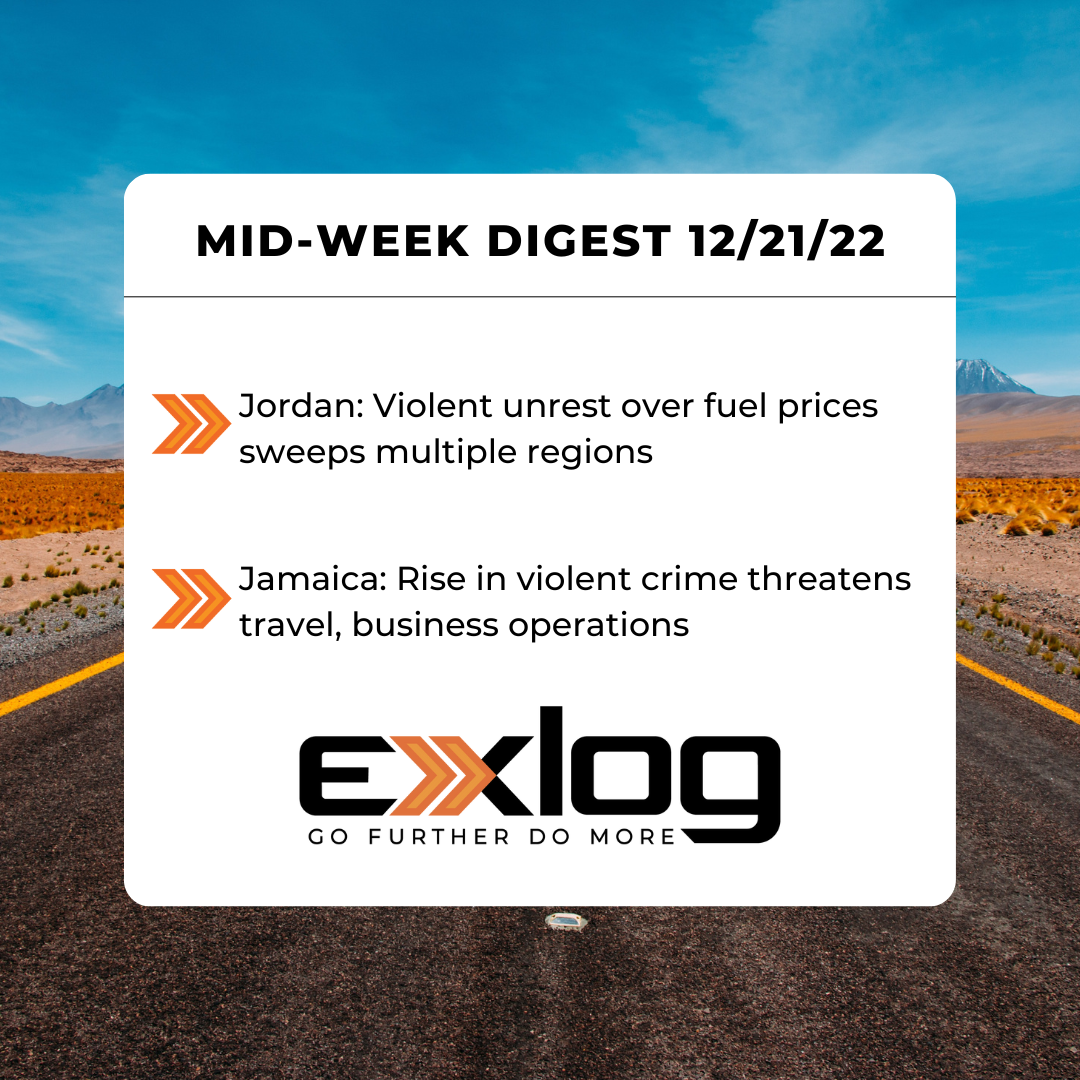Anti-government protests in Jordan and rising violent crime in Jamaica
Jordan: Violent unrest over fuel prices sweeps multiple regions
Protests and partial work stoppages over rising fuel prices swept multiple Jordanian cities between Dec. 5-19, resulting in casualties, arrests, and property damage and causing significant supply chain disruptions. The protests – led by bus, cab, and truck drivers – began in the southern region and spread to several large cities, including Zarqa, Irbid, and the capital Amman. Some of the protests turned violent when participants threw stones at security forces, vandalized government property, and blocked roads with burning tires. In addition to localized travel disruptions in the affected areas, protesters also blocked several highways linking Amman to other governorates; the routes have since been reopened. Clashes between protesters and security forces were reported in several cities, including in the southern city of Ma’an, where a police officer was shot and killed during a protest on Dec. 15. According to the figures from the Jordanian police, 44 protesters have been arrested, and 49 police officers have been injured since the protests and strikes escalated on Dec. 15. The unrest also disrupted the distribution of imported goods from the country’s main Red Sea port of Aqaba and affected the haulage of cargo to the neighboring Iraqi and Saudi markets. Activists reported that internet services had slowed down in several regions, interrupting the operation of social media platforms utilized to share footage of confrontations between police and protesters. While violent civil unrest of this magnitude is unusual for Jordan, peaceful protests over rising energy prices and other economic grievances are common. Truck drivers in the city of Ma’an signed an agreement with lawmakers to end the strike on Dec. 19, although protesters from other cities vowed to continue the work stoppage, indicating that localized protests are likely in the short term.
Jamaica: Rise in violent crime threatens travel, business operations
The security environment in Jamaica has deteriorated in recent months as elevated levels of criminal activity have prompted the government to implement two States of Emergency (SoEs) thus far in 2022. The latest emergency decree remained in effect across nine of Jamaica’s 14 perishes – including the capital Kingston and the popular tourist destination, Montego Bay – between Dec. 6-20; at the time of publication, the government has not announced an extension. Jamaican authorities have attributed the rise of violent crime – including homicide, sexual assault, and armed robberies – to organized gangs (locally known as posses), who finance their activities through extortion, lottery scams, and drug trafficking. Jamaica touted the highest murder rate throughout the Caribbean and Latin America in 2021 and recorded a 3% increase in homicides between January and early December, compared to the same time period last year, with approximately 70% of murders related to gang violence. The SoE allows security forces to arrest and carry out searches without a warrant, which has resulted in numerous allegations of police brutality, arbitrary detentions, and extrajudicial killings, which the Jamaican government has denied. While SoEs have become standard practice in Jamaica’s crime prevention strategies since late 2017, such measures have failed to reduce gang violence in the long term. Authorities claimed that the previous SoE (Nov. 15-29, 2022) contributed to a 64% decline in homicides during that time period; however, the number of violent criminal incidents increased when the measures were lifted, which prompted the government to reinstate the SoE on Dec 6. In response to the rise in violent criminal activity, several foreign governments – including the US and Canada – have updated their travel advisories, threatening Jamaica’s tourism industry which accounts for approximately 30% of the country’s GDP. While the implications of the latest SoE remain unclear, it is unlikely to permanently improve the security environment, indicating an elevated threat to travelers and businesses in the short-to-medium term.


